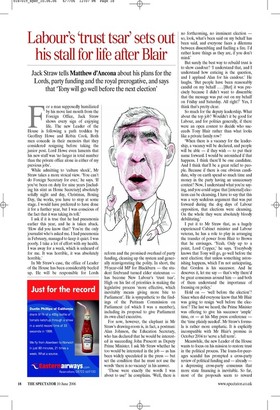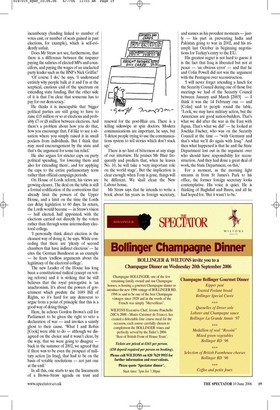Labour’s ‘trust tsar’ sets out his stall for life after Blair
Jack Straw tells Matthew d’Ancona about his plans for the Lords, party funding and the royal prerogative, and says that ‘Tony will go well before the next election’ For a man supposedly humiliated by his move last month from the Foreign Office, Jack Straw shows every sign of enjoying life. The new Leader of the House is following a path trodden by Geoffrey Howe and Robin Cook. Both men concede in their memoirs that they considered resigning before taking the junior post. Lord Howe even laments that his new staff was ‘no larger in total number than the private office alone in either of my previous jobs’.
While admitting to ‘culture shock’, Mr Straw takes a more stoical view. ‘You can’t do Foreign Secretary for ever,’ he says. ‘If you’ve been on duty for nine years [including his stint as Home Secretary] absolutely solidly night and day, Christmas, Boxing Day, the works, you have to stop at some stage. I would have preferred to have done it for a further year, but I was conscious of the fact that it was taking its toll.’ I ask if it is true that he had pneumonia earlier this year, and he is taken aback. ‘How did you know that? You’re the only journalist who’s asked me. I had pneumonia in February, managed to keep it quiet. I was poorly. I take a lot of effort with my health. I was away for a week, which is unheard of for me. It was horrible, it was absolutely horrible.’ In Mr Straw’s case, the office of Leader of the House has been considerably beefed up. He will be responsible for Lords reform and the promised overhaul of party funding, cleaning up the system and generally reinvigorating the polity. In short, the 59-year-old MP for Blackburn — the student firebrand turned elder statesman has become New Labour’s ‘trust tsar’. High on his list of priorities is making the legislative process ‘more effective, which inevitably means giving more bite to Parliament’. He is sympathetic to the findings of the Puttnam Commission on Parliament (of which I was a member), including its proposal to give Parliament its own chief executive.
For now, however, the elephant in Mr Straw’s drawing-room is, in fact, a postman: Alan Johnson, the Education Secretary, who has declared that he would be interested in succeeding John Prescott as Deputy Prime Minister. I ask Mr Straw whether he too would be interested in the job — as has been widely speculated in the press — but set the condition that he must not use the words ‘there is no vacancy’ in his answer.
‘Those were exactly the words I was about to use!’ he complains. ‘Well, there is no forthcoming, no imminent election so, look, what’s been said on my behalf has been said, and everyone faces a dilemma between dissembling and fuelling a fire. I’d rather leave things as they are, if you don’t mind.’ But surely the best way to rebuild trust is to show candour? ‘I understand that, and I understand how enticing is the question, and I applaud Alan for his candour.’ He laughs. ‘But people have been reasonably candid on my behalf ... [But] it was precisely because I didn’t want to dissemble that the message was put out on my behalf on Friday and Saturday. All right?’ Yes, I think that’s pretty clear.
So much for the deputy leadership. What about the top job? Wouldn’t it be good for Labour, and for politics generally, if there were an open contest to decide who succeeds Tony Blair rather than what looks like a private family row?
‘When there is a vacancy for the leadership, a vacancy will be declared, and people will be able — if they wish — to put their name forward. I would be astonished if that happens. I think there’ll be one candidate. And I think that’ll be a great relief to people. Because if there is one obvious candidate, why on earth spend so much time and money in the party having an unnecessary contest? Now, I understand what you’re saying, and you could argue that [internal] elections can be cleansing. I have to say that this was a very sedulous argument that was put forward during the dog days of Labour opposition, that elections were cleansing. On the whole they were absolutely bloody debilitating.’ I put it to Mr Straw that, as a hugely experienced Cabinet minister and Labour veteran, he has a role to play in arranging the transfer of power from Blair to Brown that he envisages. ‘Yeah. Only up to a point, Lord Copper,’ he says. ‘Everybody knows that Tony will go, go well before the next election; that unless something astonishing happens, which I’m not anticipating, that Gordon is his successor. And he deserves it, let me say — that’s why there’d be great consensus around him — and both of them understand the importance of focusing on policy.’ Hold on — ‘well before the election’? Since when did everyone know that Mr Blair was going to resign ‘well before the election’? The last we heard, the Prime Minister was offering to give his successor ‘ample’ time, or — at his May press conference the ‘time plainly needed’. Mr Straw’s formula is rather more emphatic. It is explicitly incompatible with Mr Blair’s promise in October 2004 to ‘serve a full term’.
Meanwhile, the new Leader of the House wants to focus on his mission to restore trust in the political process. The loans-for-peerages scandal has prompted a cross-party review of political funding and — already a depressing cross-party consensus that more state financing is inevitable. So far, most of the proposals seem to reward incumbency (funding linked to number of votes cast, or number of seats gained in past elections, for example), which is self-evidently unfair.
Does Mr Straw not see, furthermore, that there is a difference between the taxpayer paying the salaries of elected MPs and councillors, and paying the wages of an unelected party leader such as the BNP’s Nick Griffin?
‘Of course I do,’ he says. ‘I understand entirely why people balk at it and I’m at the sceptical, cautious end of the spectrum on extending state funding. But the other side of it is that I’m clear that someone has to pay for our democracy.’ He thinks it is inescapable that ‘bigger political parties are still going to have to raise £15 million or so at elections and probably £7 or £8 million between elections. And there’s a problem about how you do that, how you encourage that. I’d like to see a situation where you simply raised it in small pockets from individuals. But I think that may need encouragement by the state and that’s the argument for some tax relief.’ He also argues for stricter caps on party political spending, ‘for lowering them and also for extending them’, and for applying the caps to the entire parliamentary term rather than official campaign periods.
On House of Lords reform, his views are growing clearer. The deal on the table is still a formal codification of the conventions that already limit the powers of the Upper House, and a limit on the time the Lords can delay legislation to 60 days. In return, the Lords would become — in Straw’s vision — half elected, half appointed, with the elections carried out directly by the voters rather than through some intermediary electoral college.
‘I personally think direct election is the cleanest way of doing it,’ he says. While conceding that there are ‘plenty of second chambers that have indirect elections’ — he cites the German Bundesrat as an example — he fears ‘endless arguments about the legitimacy of the electoral college’.
The new Leader of the House has long been a constitutional radical (except on voting reform) and it is striking that he still believes that the royal prerogative is ‘an anachronism. It’s about the powers of government which predate the 1689 Bill of Rights, so it’s hard for any democrat to argue from a point of principle that this is a good way of doing things.’ Here, he echoes Gordon Brown’s call for Parliament to be given the right to veto a declaration of war — and invokes a saintly ghost to their cause. ‘What I and Robin [Cook] were able to do — although we disagreed on the choice and it wasn’t clear, by the way, that we were going to disagree back in the summer of 2002, we agreed that if there was to be even the prospect of military action [in Iraq], that had to be on the basis of votable resolutions — not just one at the end.’ In all this, one starts to see the lineaments of a Brown–Straw agenda on trust and renewal for the post-Blair era. There is a telling sideswipe at spin doctors. Modern communications are important, he says, but ‘I detest people trying to use the communications system to tell stories which don’t stack up.’ There is no hint of bitterness at any stage of our interview. He praises Mr Blair frequently and predicts that, when he leaves No. 10, he will take a ‘very important role on the world stage’. But the implication is clear enough: when Tony is gone, things will be different. We shall clean the New Labour house.
Mr Straw says that he intends to write a book about his years as foreign secretary, and names as his proudest moments — justly — his part in preventing India and Pakistan going to war in 2002, and his triumph last October in beginning negotiations for Turkey’s entry to the EU.
His greatest regret is not hard to guess: it is the fact that Iraq is liberated but not at peace — ‘an obvious error’ — and that he and Colin Powell did not win the argument with the Pentagon over reconstruction.
‘I will never forget attending a lunch for the Security Council during one of those five meetings we had of the Security Council between January and March [2003] — I think it was the 14 February one — and [Colin] said to people round the table, “Look, we may have military action, but the Americans are good nation-builders. That’s what we did after the war in the East with Japan. That’s what we did” — he looked at Joschka Fischer, who was on the Security Council at the time — “with Germany and that’s what we’ll do again with Iraq.” And then what happened is that he and the State Department lost out in the argument over who should have responsibility for reconstruction. And they had done a great deal of work, the State Department, on this.’ For a moment, as the morning light streams in from St James’s Park to his office, the former foreign secretary looks contemplative. His voice is quiet. He is thinking of Baghdad and Basra, and all he had hoped for. ‘But it wasn’t to be.’



















































































 Previous page
Previous page